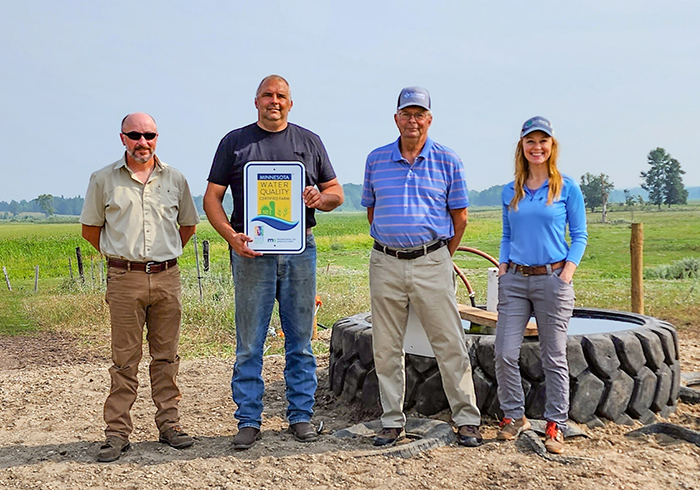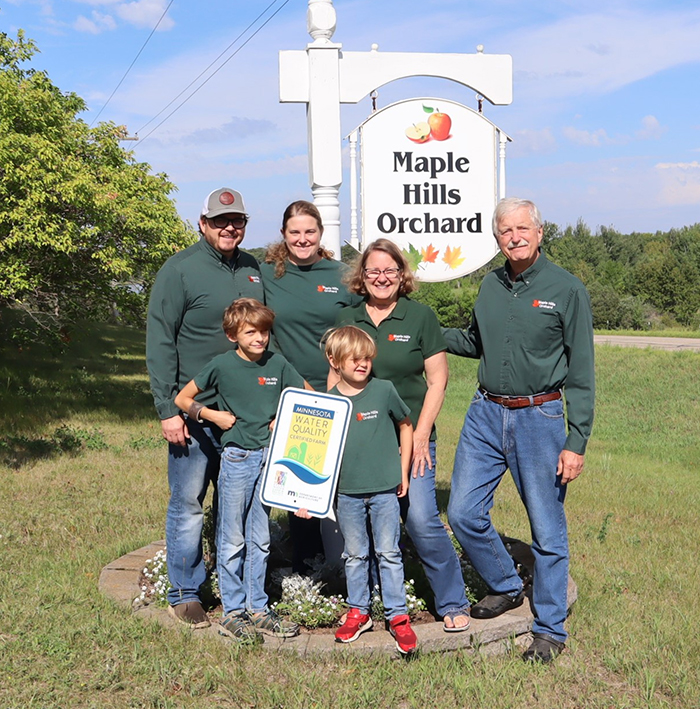Trieglaffs, Maple Hills Orchard Ag water quality certified
News | Published on August 22, 2023 at 4:50pm EDT | Author: frazeevergas
0
Father-son farming duo, Tom and Tyler Trieglaff join the rising number of producers becoming water quality certified under the Minnesota Agricultural Water Quality Certification Program (MAWQCP)—a voluntary opportunity that certifies farmers taking the lead in implementing conservation-minded practices to protect water quality. The Trieglaff’s combination of rented and owned pasture and cropland, totaling over 2,000 acres achieved certification in July of this year, accompanying over 1,300 Minnesota producers farming over 950,000 certified acres within the program.

“The certification was just another step in our farm’s progression,” Tyler said. “But honestly, it really makes us feel good.”
The Trieglaff farm homesteaded in Becker County back in 1871, where dairy production was the primary source of income along with some row crops, and continued to be until 2014. However, after some medical complications within the family, the farming operation switched from dairy to beef and has continued onward as such.
“I always say our way of farming hasn’t changed, only the kind of chores we have,” Tyler mentioned.
The EQUIP program with the National Resource Conservation Service (NRCS) is what led Tom and Tyler toward MAWQCP. The program’s funding provided the duo the necessary funding to help install new fencing, water lines, water-tire tanks, and begin rotationally grazing to improve their 70 cow/calf pair herd, land, and surrounding water quality.
“We want to make sure the water upstream is just as good as it is downstream,” Tom said, referring to the Otter Tail River that flows through a portion of their property.
In the future, the fourth and fifth-generation farmers, along with the upcoming sixth, Tyler’s son, Karsen, hope to incorporate more conversation tillage into their cropland practices as well as cover crops, but are sticking to rotationally grazing for now.
The rotational grazing practice involves moving livestock to different units of pasture to encourage recovery of the previously grazed vegetation, preventing soil erosion, and promoting water quality while cover crops can be defined as any non-cash crop grown to the primary cash crop. These crops have the potential to increase soil organic matter, reduce erosion, improve soil structure, and promote water infiltration. Conversation tillage helps maintain plant residues on at least 30 percent of the soil surface after tillage practices are complete, this too, helps reduce erosion and promote water quality.
“Both EQUIP and MAWQCP programs have supplied us with both the education and means to change what we have always done, which was hard. Change is the hardest thing on a farm,” Tyler said. “But overall, we’re just trying to improve the environment around us and become more sustainable.”
Maple Hills Orchard Ag water quality certified
Julie Oney and her father, Gary Goreham, have recently become another pair of certified stewards of water quality through the Minnesota Agriculture Water Quality Certification Program (MAWQCP), a voluntary program that certifies producers using conservation-minded practices to protect the State’s water quality. Their orchard, managed as Maple Hills Orchard, operates northwest of Frazee in Becker County.
The orchard was established in 1998 when Gary and his wife, Jonna purchased the 30 acres of land and began building their apple house the following year, and completed it in 2001. Currently, Maple Hills Orchard consists of 600 apple trees along with cherry trees, grapes, and raspberries totaling 7 acres with an additional 200 apple trees planned to be added over the next several years.
“Becoming certified means we are moving closer to a sustainable future and protecting our resources for the next generation,” Oney said. “It also means we can say that we are doing what we can and that we are doing our part.”
Unique for an apple orchard, Maple Hills uses no non-organic insecticides or fungicides and instead manages pests within traps, beneficial insect habitats, and frequent scouting and hand-picking. Grass and weeds beneath the trees and amongst the raspberry patch are controlled through annual herbicide applications, which also reduces fungal pressures. Other conservation practices Oney implements include tree plantings, windbreaks, filter strips buffering a nearby wetland, and a half acre of pollinator and beneficial insect habitat.
“We focus a lot on sustainability and what we can do to mitigate the risks of climate change,” Oney said. “And protecting our environment and water is a huge part of that. It’s really important that we protect our most precious resource.”
In the future, Oney hopes to become a Community Supported Agriculture (CSA) producer for the Detroit Lakes and Frazee areas, growing and selling tomatoes, pumpkins, and sweet corn within their two acres of dedicated gardens to the community besides their fruit crop as a beacon of hope and an example in sustainability.
“We only have this one planet—and one time to save the environment for future generations,” Oney said. “If more people cared about water, climate, and sustainability, I have no doubt we could make a difference for a brighter future.”
For more information about the Minnesota Agricultural Water Quality Certification Program, contact the East Otter Tail Soil and Water Conservation Office at (218) 346-9105 or visit their website: www.eotswcd.org.

